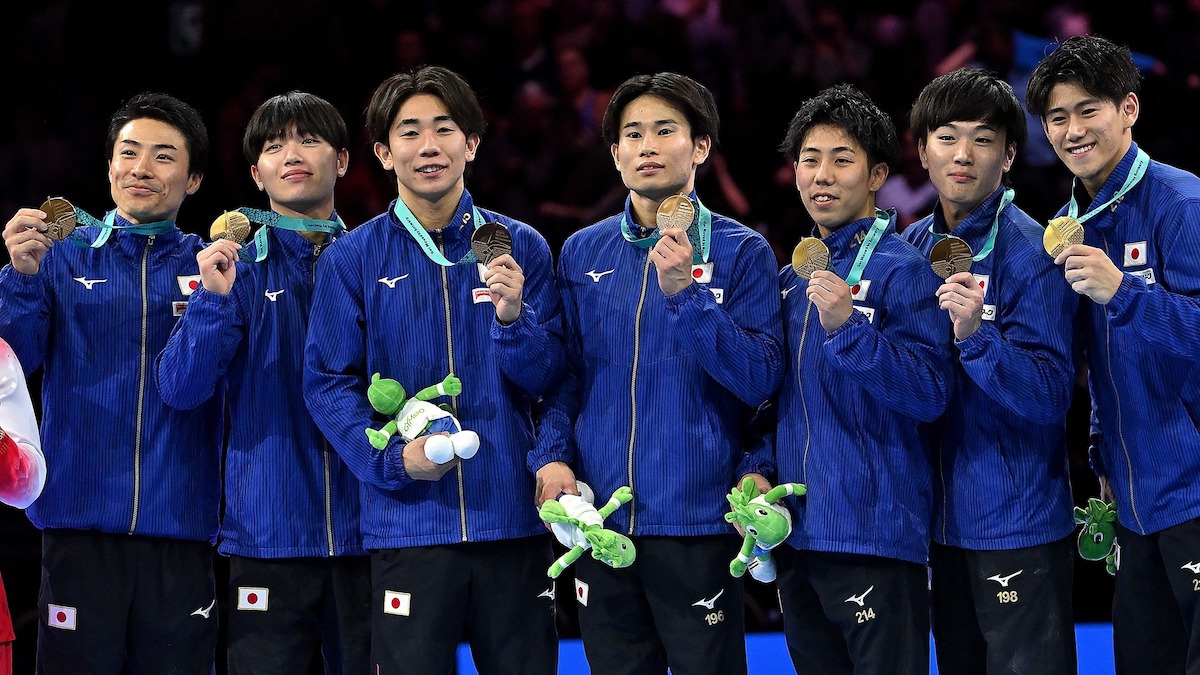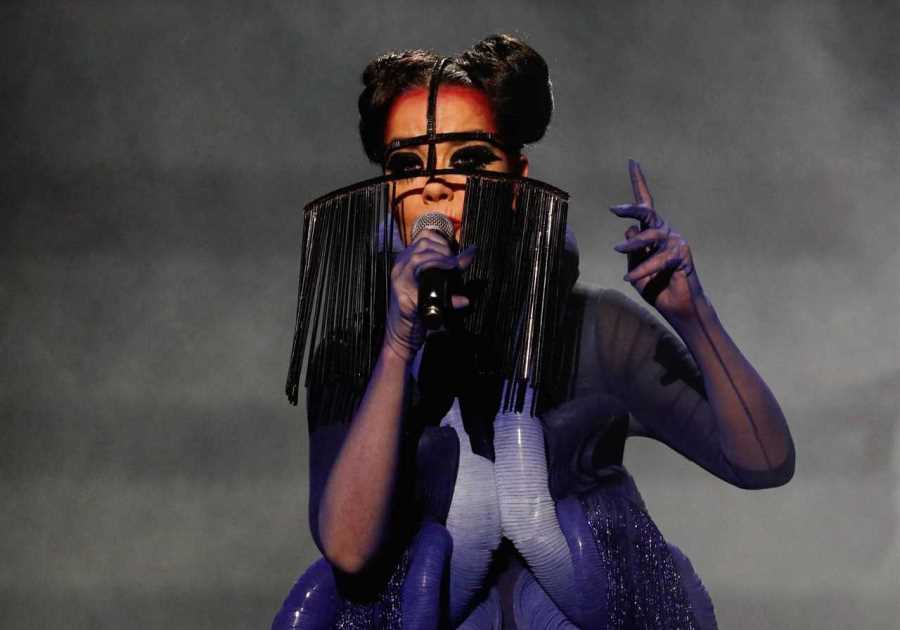
A chaotic qualification round for the men at this year’s world championships saw the U.S. men land in second place with China just tenths away from almost missing the final completely, making yesterday’s team final one of the least predictable we’ve seen in years.
With nearly a four-point lead in qualifications, Japan came into the final as the clear favorites for gold, and despite a few rocky moments, the team ultimately came out on top with a 255.594, defeating the reigning champions from China by 1.8 points to win their first worlds team title since 2015.
The competition started out with a nervous floor routine from Chiba Kenta, who was also a bit weak on pommel horse, though things slowly picked up over the next couple of routines and rotations, and by the time Japan got to vault, they began to show exactly why they would become the champions. Led on vault by a stuck Kas double full from Minami Kazuki (who also competed an impossible double double half-out to punch front layout full on floor!), the team did very well overall there to score a 44.533, following it up on parallel bars with three clean and smooth routines that all scored in the 14.7-14.8 range.
They finished well on high bar, capped off with a 14.366 from Hashimoto Daiki, who but the entire rotation was a good one, with the team posting the high of 41.932 there, after previously putting up the highs on pommel horse and parallel bars. In addition to the big scores that came in from Hashimoto and Minami, Kaya Kazuma was a star of the final going up on five events and scoring a 14.0 or higher on all of them, Sugimoto Kaito came in as the alternate to contribute solid sets on rings and parallel bars, and Chiba came back from his early disappointments to show clean work on rings and high bar, making their title a true team effort.
Despite China’s rocky start to the competition in prelims, where they finished eighth, it was clear that if they fixed a few rough spots, they’d still very well be in the hunt for not only a medal, but for gold, especially when they replaced Shi Cong with Lin Chaopan. Lin wasn’t originally named as the alternate, but with Shi out, the program opted to fly him in from Hangzhou, where he had just won a gold medal with his team as well as the bronze on floor at the Asian Games, instead of relying on Yang Jiaxin, who was dealing with an illness.
It was a risky decision, given that Lin had to endure a long flight and a major time change adjustment in order to make it in time for the final, with no guarantee that he’d look as strong as he did in Hangzhou. He didn’t have any massive scores or lead on any of the apparatuses, but he was steady in everything I saw him do, with only minor mistakes here and there throughout his five routines. His most important score coming on high bar, where he earned a 14.133, and though a 13.2 doesn’t seem all that great for pommel horse, compared to what the team showed there in qualifications, it was absolutely a step up.
The team had its best efforts on rings, where specialists You Hao and Liu Yang brought in scores of 14.866 and 15.0, respectively, and on parallel bars, where You was once again a standout along with Sun Wei, who proved what a leader he could be for this team with six strong routines across the competition, including rotation-leading scores on pommel horse, vault, and high bar. Su Weide is the only one who really struggled here, counting two falls on high bar, but he contributed well on floor, where he posted the team’s top score of 14.1, and on vault.
It’s true that they could’ve been better prepared to take the gold with a hit high bar set from him, but I think ultimately the “right” team won, with Japan just ever so much stronger and more well-balanced this year, defeating China on four of the six events and coming close to doing it on a fifth as well. China had a massive edge over Japan on rings alone with two world-class specialists on the team, but I like that a team with more of an overall picture was able to stay ahead.
The U.S. men qualified in second place, but it was clear that with China back at a higher level in the final, the real fight would be between Japan and China for gold while the United States and Great Britain battled it out for bronze. While things were looking that way for a while, the U.S. actually got closer to silver than the British men got to bronze, finishing less than a point and a half back from getting a massive upset while their total of 252.428 was just about three full points greater than the British team’s score of 249.461.
This was the first team medal for the U.S. men since they last won bronze in 2014. Having placed fourth or fifth in every world championships or Olympic Games team final since then, it’s been a frustrating decade, but this young team under the leadership of Yul Moldauer came into this competition with one of the strongest programs and best shots at a medal, and would really just be fighting against themselves and their history of inconsistency on the way to getting on the podium.
Qualifications proved that the U.S. team could get on the podium, as even with a minor breakdown on bars, the U.S. still managed to finish second behind Japan. Things got a little nerve-wracking in the team final, where pommel horse standout Khoi Young had a fall while Fred Richard wasn’t credited some of his difficulty, but at that point they’d already gotten through a great floor rotation and then were able to make up some ground on rings and especially on vault, where Asher Hong did one of his best Ri Se Gwang attempts for a 15.1.
Parallel bars went smoothly for the U.S., followed by a much-improved high bar rotation, where Paul Juda was especially steady while Richard put up the best routine of the competition, earning a 14.533.
The U.S. men making high bar, usually a weak spot, into a strength with a third-best score out of all eight teams on the apparatus is what sealed the medal for them, while the British men unfortunately made it harder for themselves there, with the lack of any true high bar workers on the team not helped by a fall from James Hall, who also came off on pommel horse earlier in the meet. Ending on floor seemed like it might be able to keep them above water, especially if the Americans fell apart on high bar, but a fall from the normally excellent Harry Hepworth took them out of the running.
Hepworth does get credit for excellent work on rings and vault earlier in the day, with vault an exceptional rotation for the men. Courtney Tulloch also fought back well there after a fall in prelims, while Jake Jarman stuck his Kas 2½ for a massive 15.4, with Jarman overall showing an incredible performance with five scores contributed to the team, all for solid hit routines. Tulloch was also productive for the team on rings, while Hall was great on most of his events, bringing in the top score for the team on parallel bars with a 14.466, and Max Whitlock was an ace on pommels with a 15.266 while also contributing strong lead-off routines on parallel bars and high bar.
The rest of the teams here weren’t quite at the level to contend for medals here, despite a few wild standings in prelims, where Canada finished in an especially shocking fourth place, the highest ever for the team. I was hoping for a top 10 finish for them, and I think they were too, as they said they were so not expecting to make the team final that all of their preparation had simply been about qualifying to the Olympics with absolutely zero thought put into finals success.
Germany was another team with a much higher finish than expected, especially given all of their recent injuries and team changes, with alternate Nick Klessing stepping in at the very last second after Andreas Toba injured his knee during podium training. They stunned in prelims to not only earn a team berth for Paris, but to also surprise for the team final, and though they had some errors in that stage of competition, I think they were just thrilled to have qualified.
Switzerland was the top among these teams, finishing fifth with a 244.426, ahead of Germany in sixth with a 244.026, Canada in seventh with a 243.028, and Italy in eighth with a 241.160.
Article by Lauren Hopkins
-----------------------
By: Lauren
Title: Japanese Men Back on Top After Eight Years; U.S. Men Win First Medal in Nine
Sourced From: thegymter.net/2023/10/03/japanese-men-back-on-top-after-eight-years-u-s-men-win-first-medal-in-nine/
Published Date: Wed, 04 Oct 2023 02:05:00 +0000
Did you miss our previous article...
https://ballerawards.news/sports/2023-world-championships-womens-allaround-final-live-blog






